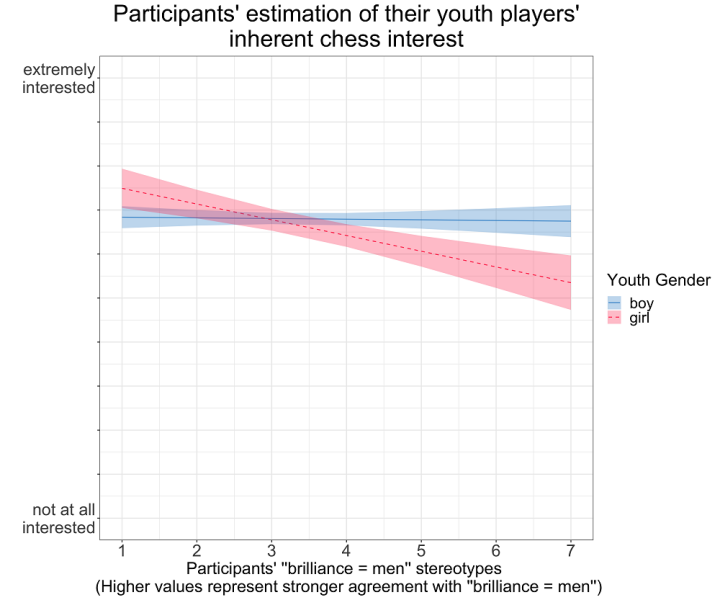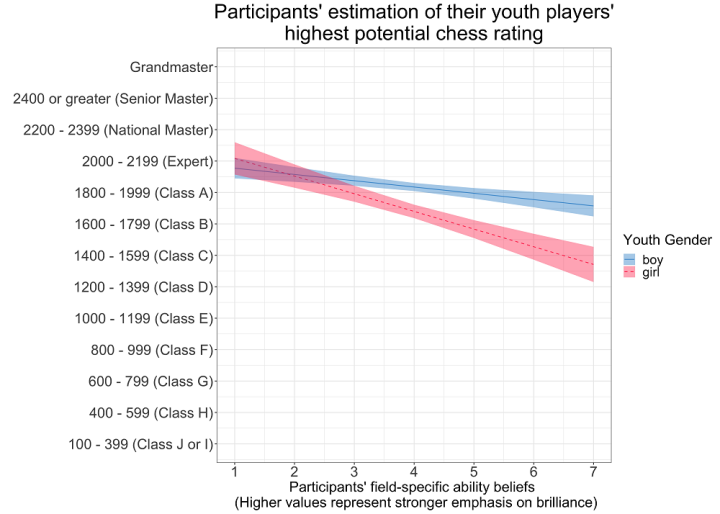


The authors of the study - published in full as Checking Gender Bias: Parents and Mentors Perceive Less Chess Potential in Girls - were Sophie H. Arnold, Wei Ji Ma and Andrei Cimpian from the Department of Psychology (New York University); April H. Bailey from the Department of Psychology at the University of New Hampshire; and NYU alumna Jennifer Shahade (who contributed to the design of the study as an independent scholar).
The study examined the presence and extent of gender bias within the chess community. The psychology researchers focused on whether parents and mentors showed bias towards the female youth players in their own lives (e.g. daughters, sisters, nieces, etc.). The adults surveyed for this purpose were parents and mentors of chess-playing children affiliated with the US Chess Federation. These participants were asked to rate their children (for parents) or their mentees (for coaches) on various dimensions ranging from potential and inherent ability to aspects such as how much money and resources they were willing to spend on their children's chess development.
The team interviewed 286 participants, 90.6% of whom were men. Here the researchers note that the sample of mothers and female coaches was too small to even consider separately - presumably „a reflection of women’s underrepresentation in chess more generally," the authors add. The parents and mentors were recruited through the US Chess Federation. In the provided survey they were asked to give their evaluations of and investment in approximately 650 youth players. Parents and coaches were also asked "if they thought aptitude in chess requires brilliance". (A measure that Cimpian and his colleagues have already used in the past to successfully identify stereotyping and gender bias in academic fields.)
"These beliefs are likely to be harmful both to girls who already play chess and to those who could want to: Would you be interested in participating in an activity where your potential is downgraded by your parents and by your coaches before you have even started?" asks former US chess champion Jennifer Shahade rhetorically in the official release of the NYU study.
The paper points to the fictional phenomenon of female chess player Beth Harmon in the Netflix miniseries, which was an incredibly popular show in 2020 and brought chess back into the mainstream. "While it is inspiring to see a fictional woman winning in a space dominated by men, real-world women remain underrepresented in chess," writes writes the paper's lead author and NYU doctoral student Sophie Arnold. She goes on to explain that the study - published in the Journal of Experimental Psychology: General - aimed to identify one of the reasons why. The result will probably come as no surprise to most experienced female chess players: Parents and coaches are biased against female youth players and therefore clearly underestimate their potential. Yet these parents and coaches are completely unaware of the damage they're doing to the girls in their own environment.

A diagram showing the results of the participants’ estimation of the youth players’ inherent chess interest. Credit: Courtesy of Sophie Arnold, NYU.
While previous scientific observations on gender differences in chess have mostly focused on determining whether the overrepresentation of men among the best players is due to gender differences that affect their playing performance, significantly less work has examined how structural factors such as bias and discrimination (the most commonly cited reasons by female players for giving up chess) contribute to the underrepresentation of women in chess. For example, the role of adult leadership has been largely overlooked, say the psychologists. "This line of scholarship can make the overrepresentation of men in chess seem like it’s a ‘girls and women problem’ rather than a ‘chess problem,’" points out Arnold. Therefore, the NYU team built the study on reliable past research "providing the first large-scale quantitative investigation of the obstacles that girls and women encounter in chess." It was also investigated whether parents and mentors perceive a biased environment against female youth players in chess or not.

A graphic representation of the results of the participants’ estimation of the youth players’ highest potential chess rating. Credit: Courtesy of Sophie Arnold, NYU.
The study’s main findings:
To conclude, we can say that the discussed research has bought an important scientific insight to the phenomenon of why women and girls are still underrepresented in chess. It was examined how gender bias contribute to this, specifically how "the adults with the power to guide youth players’ chess careers and the motivation to accurately assess youth players’ abilities" project their bias on female youth players affecting negatively their potential. Also, valuable data on "whether this bias is magnified by the beliefs that brilliance is required to succeed in chess and that men are more brilliant at chess than women" was collected and made available to the public through the Journal of Experimental Psychology: General. The entire study is available here.
The results of the here discussed research clearly prove that already very young female chess players face challenges and barriers based on their gender that male players don’t. The proofs provided in this study indicate an urgent need for "greater awareness and efforts to promote gender equity" in the game of chess. "By recognizing and addressing these biases, it may be possible to create a more inclusive and supportive environment for female players and, in the long run, reduce the gender imbalances in chess", conclude in agreement the authors of the Checking Gender Bias: Parents and Mentors Perceive Less Chess Potential in Girls study.
The author of this article would like to thank the NYU and all the involved individuals for the given trust and smooth collaboration on this piece.
| Advertising |